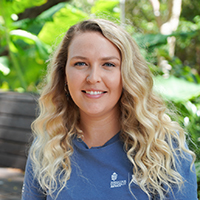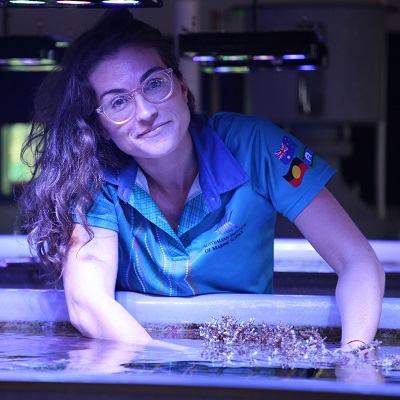Fast Facts
Location
Commencing
- Townsville: January, September
Fees
$8,970.00+
$35,110.00^
+estimated annual Commonwealth Supported Fee for a full-time study load. Please note this estimate is variable and subject to fluctuation depending on choice of elective subjects.
^estimated annual tuition fee for a full-time study load
Plus Student Services and Amenities fee
Fee deferral and scholarships available if eligible
Currently displaying fees for 2025, which are subject to change in following years.
Duration
2 years full-time
Entry Requirements
AQF level 7 bachelor degree in science with a minimum GPA of 5.0, or equivalent
Course Code
119504
Course detail
Develop a comprehensive knowledge of marine biology as well as a diverse skill set with this interdisciplinary marine biology degree. Participate in specialised, hands-on training in unmatched locations like the JCU Orpheus Island Research Station on the Great Barrier Reef. Gain extensive experience in research methods and data and laboratory analysis while honing your data science and communication skills to bring your practise and research to the next level. Prepare for your future career through internships within government agencies and research institutions involved with the stewardship of UNESCO World Heritage listed coral reefs and other extraordinary environments like mangrove forests and the deep sea.
Gain advanced knowledge and experience in the five areas that are most sought after by marine sector employers: marine biology, mathematics/statistics/modelling, environmental science and management, marine and microbial ecology, and cross-disciplinary studies. Enhance your research capabilities with the advanced research skills embedded in all subjects of the degree. Pursue your passion for discovery through the Master of Marine Biology’s Research major or gain valuable hands-on experience during a three-month workplace internship with one of JCU’s leading industry or government partners.
Go deeper into the areas of marine biology that spark your passion as you explore topics such as quantitative marine ecology, conservation biology, fisheries, and the biology, life history and taxonomy of tropical marine organisms. You will study tropical marine systems with an emphasis on coral reefs and surrounding waters, seagrass meadows, mangrove assemblages and the adjacent sandy and rocky shores.
JCU is a university for the Tropics, a region that is home to 80 per cent of the world’s terrestrial species and over 90 per cent of its mangroves and reef-building corals*, meaning your studies will equip you with the knowledge and skills to promote the conservation of the majority of the world’s biodiversity. Gain in-depth experience through field trips, laboratory-based classes, research projects and professional internship opportunities through JCU’s unique access to learning environments including the JCU Orpheus Island Research Station, the new Technology and Innovation Centre at the JCU Townsville, Bebegu Yumba campus, Douglas, the Marine and Aquaculture Research Facility (MARF), as well as the Advanced Analytical Centre (AAC) and high performance super computer.
As you study the Master of Marine Biology at JCU, you’ll get to sharpen your skills with researchers from the Centre for Tropical Water and Aquatic Ecosystem Research (TropWATER), and the Centre for Sustainable Tropical Fisheries and Aquaculture (CSTFA). At JCU Townsville, you will also study and research in JCU’s The Science Place, the first educational facility in Australia to achieve the LEED Gold certification for its environmentally sustainable design.
Build networks with students from all around the globe who study marine biology at JCU as well as the internationally renowned industry experts you’ll encounter through work integrated learning opportunities and the optional three-month internship. Be part of a tight knit community of marine scientists who call North Queensland home — global researchers and specialists across a range of sectors working together on important projects at the forefront of marine science, such as new technologies for coastal ecosystem mapping, reef regeneration projects, and citizen science projects like The Great Reef Census. Townsville is the world’s second most-prolific city for research related to the United Nation’s Sustainable Development Goal number 14, Life Below Water.**
In the three-month internship option, you can gain professional experience in conservation science, environmental management, fisheries, eco-tourism, science communication, big data, or policy development. You will be mentored by industry experts as you apply your knowledge and skills on real-world challenges throughout this work experience. Get prepared for your dream career in marine science by developing the networks, skills and experiences that will lead to employment opportunities post-graduation. You will intern with leading organisations located in Townsville, further afield in Australia, or internationally.
If you opt for the research major, at the outset of the second year of your Masters you will have the opportunity to undertake a year-long research project on the topic of your choice. Course coordinators will help you make connections with supervisors (internal and/or external). Some students choose a project with co-supervision with JCU academic staff and an industry partner, such as the Commonwealth Scientific and Industrial Research Organisation (CSIRO), the Australian Institute of Marine Science (AIMS) and JCU’s Centre for Tropical Water and Aquatic Ecosystem Research (TropWATER). Popular research topics include the biology and ecology of marine organisms and factors influencing habitat. Entry to the research major will require you to have a topic chosen and supervisor confirmed by the end of your first year of study.
Graduate with confidence in tropical Australia, on the shores of the Great Barrier Reef, where graduate employers and key research end-users are seeking out marine biology experts who can contribute to conserving and improving tropical ecosystems and societies. Studying and working in North Queensland will have you operating in a hub for marine sciences with many employers and research bodies, including the Australian Institute of Marine Science (AIMS) and the Great Barrier Marine Park Authority (GBRMPA).
*The Conversation
**Nature Index 2021
About JCU’s Master of Marine Biology
Pursue your passion for the ocean and marine life with a Master of Marine Biology degree - a comprehensive and in-depth course studying the biology and ecology of the ocean with a strong focus on hands-on experiences. Access diverse learning environments including JCU Orpheus Island Research Centre on the Great Barrier Reef and state-of-the-art laboratory facilities.
Access the best of teaching and research
Academics involved with the Master of Marine Biology are internationally renowned experts in their field. JCU staff and alumni associated with the Master of Marine Biology have broad networks of collaboration with universities, government departments, private sector organisations, NGOs and other research organisations across Australia and internationally.
Study marine biology in the most beautiful locations on Earth
Take advantage of JCU’s real-world practical experience. Study your marine biology master’s degree on-site at coral reefs, islands, mangroves, and seagrass beds in the Great Barrier Reef Marine Park. Access JCU’s research vessels and the JCU Orpheus Island Research Station as well as the Marine and Aquaculture Research Facility (MARF) on-site at JCU Townsville, Bebegu Yumba campus, Douglas. Learn from lecturers who are passionate about addressing the challenges of our seas and coasts. Together with industry professionals, you will research solutions for the future and be part of a team solving problems that have eluded scientists for decades. Understand how to collect and analyse data, map coastal and marine ecosystems, assess and restore the health of marine populations, apply cutting edge molecular methods to understand effects of environmental change, and monitor and track everything under the waves. Your studies will take you to coral reefs, inter-tidal zones, mangrove assemblages and seagrass meadows.
Inherent requirements
Inherent requirements are the identified abilities, attributes, skills, and behaviours that must be demonstrated, during the learning experience, to successfully complete a course. These abilities, attributes, skills, and behaviours preserve the academic integrity of the University’s learning, assessment, and accreditation processes, and where applicable, meet the standards of a profession. For more information please review the inherent requirements for the Master of Marine Biology.
As a graduate of JCU's Master of Marine Biology you will have outstanding discipline knowledge of marine biology, transferrable scientific, technical and quantitative skills, and qualities that enable you to contribute to improving marine ecosystems and tropical societies.
During your one-year research project or three-month professional internship you will have opportunities to work with national and international institutions, local environmental industries, NGOs, and government departments for fisheries, science or environmental management. These opportunities frequently lead to employment or further research through PhD studies post-graduation.
Highly regarded by employers, JCU marine biology graduates are sought after within a range of private and public sector organisations, both in Australia and internationally, for technical, research, education, management and policy-related positions. You can go on to employment within a high-profile environmental management and consultancy agency, a government department, a scientific research institute, a commercial venture, or in an education, tourism or even a global environmental media group.
Estimated annual Commonwealth Supported fee: $AUD8,970.00
Estimated annual tuition fee: $AUD35,110.00
A variety of Scholarships are available to suit different student types.
JCU offers multiple Pathways to University. If you do not meet the entry requirements for this course, consider exploring our available Pathways options.
Contact our friendly team today to discover which pathway is right for you.
Complete an online application through our Online Application Portal.
Real stories
-

International Student - USA
Chase DeJarnett
Master of Marine Biology
I chose to come to JCU to study my Master of Marine Biology. I’ve always been passionate about the oceans and I’m an avid fisherman, so the water comes naturally to me. JCU is above what I had expected - the campuses are beautiful, with world renowned researchers teaching in world class facilities.
-

International Student - USA
Kaysha Kenney
Master of Marine Biology
JCU is right on the reef and it’s one of the best schools in the world for Marine Biology. I really enjoy that there’s a lot of marine biology research that comes out of James Cook University and most of it is on coral reef ecology.
-

Lecturer
Associate Professor Mia Hoogenboom
Marine Biology discipline, College of Science and Engineering
The Master of Marine Biology will provide graduates with the skills most sought after by marine sector employers. Students develop specialist knowledge in different fields of marine science, and gain hands-on experience of professional practice with either a focus on knowledge discovery or work integrated learning.
-

Employer
Dr Kate Quigley
Research Scientist - Australian Institute of Marine Science (AIMS)
JCU prepares students for a career in world-leading research through exposure to a “hands-on” learning experience in the field and in the lab, and mentorship by key researchers in marine biology. JCU students are highly capable and motivated to join research and industry partners to deliver cutting-edge science.